The Future of Medicine: UAB experts predict how medicine and health care may evolve in the coming decades
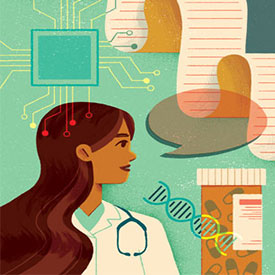 Maybe the flying cars we were promised haven’t materialized yet, but 21st-century life is still a marvel in many ways. And that certainly includes medicine and health care, where technological innovations have wrought stunning transformations in the 50 years since the University of Alabama at Birmingham was officially established.
Maybe the flying cars we were promised haven’t materialized yet, but 21st-century life is still a marvel in many ways. And that certainly includes medicine and health care, where technological innovations have wrought stunning transformations in the 50 years since the University of Alabama at Birmingham was officially established.
So what does the future hold, in terms of both the practice of medicine and the challenges facing the overall health care system? Considering how much has changed over the past half century, the possibilities are exhilarating.
Read moreA Half-Century of Excellence: Images from UAB Medicine's past 50 years
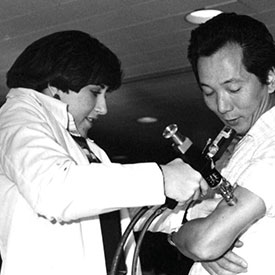 In 1969, the University of Alabama at Birmingham was born—an independent institution rooted in the Magic City, created from the union of a university extension center and a pioneering academic medical center. Since then, UAB has saved lives, solved problems, expanded knowledge, and opened doors. The ideas, innovations, and advances that emanate from our campus have energized Birmingham and transformed Alabama into a destination for experts and innovators ready to change the world.In celebration of UAB’s 50th anniversary, here we take a look back UAB Medicine’s past 50 years.
In 1969, the University of Alabama at Birmingham was born—an independent institution rooted in the Magic City, created from the union of a university extension center and a pioneering academic medical center. Since then, UAB has saved lives, solved problems, expanded knowledge, and opened doors. The ideas, innovations, and advances that emanate from our campus have energized Birmingham and transformed Alabama into a destination for experts and innovators ready to change the world.In celebration of UAB’s 50th anniversary, here we take a look back UAB Medicine’s past 50 years.
True Calling: Smita Bhatia has made it her mission to improve life after cancer
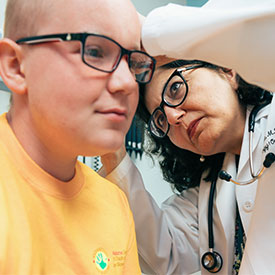 As of January 2019, the National Cancer Institute (NCI) estimates that there are 16.9 million cancer survivors living in the U.S. By 2029, that number is expected to increase by about 29% to 21.7 million cancer survivors. These numbers speak volumes to the treatment advances taking place every day.
As of January 2019, the National Cancer Institute (NCI) estimates that there are 16.9 million cancer survivors living in the U.S. By 2029, that number is expected to increase by about 29% to 21.7 million cancer survivors. These numbers speak volumes to the treatment advances taking place every day.
Meeting the Moment: A bold plan to improve Alabama’s health rankings wins UAB’s inaugural Grand Challenge
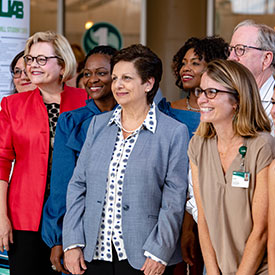 The diseases are familiar. So are the state’s rankings.
The diseases are familiar. So are the state’s rankings.
Alabama has the highest prevalence of stroke, the third-highest rate of diabetes and kidney disease, the fourth-highest incidence of heart disease, and the fifth-highest adult obesity rate. Turning these statistics around is a challenge that Mona Fouad, M.D., MPH, director of the UAB Minority Health & Health Disparities Research Center, director of the Division of Preventive Medicine, and senior associate dean for diversity and inclusion in the School of Medicine, and her team have accepted.
Read moreOpening Doors to Medicine: UAB expert offers recommendations to make medical schools more inclusive
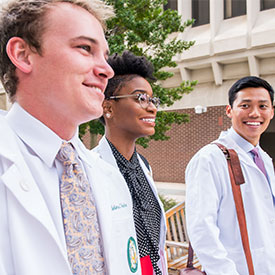 Getting accepted to and completing medical school is a challenge for any candidate but is even more challenging for people with physical, mental, or learning disabilities who frequently experience bias and discrimination.
Getting accepted to and completing medical school is a challenge for any candidate but is even more challenging for people with physical, mental, or learning disabilities who frequently experience bias and discrimination.
The Gift of Learning: Anatomical Donor Program enriches anatomy training and student experience
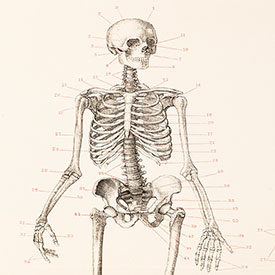 Before she was diagnosed with gastroesophageal cancer, Birmingham psychiatrist Renée Holloway, M.D., knew she wanted to donate her body to medicine. Her parents donated their bodies to the University of South Alabama College of Medicine. Holloway donated her body to the UAB Anatomical Donor Program because she worked in Birmingham and had ties to the UAB School of Medicine.
Before she was diagnosed with gastroesophageal cancer, Birmingham psychiatrist Renée Holloway, M.D., knew she wanted to donate her body to medicine. Her parents donated their bodies to the University of South Alabama College of Medicine. Holloway donated her body to the UAB Anatomical Donor Program because she worked in Birmingham and had ties to the UAB School of Medicine.
Small Player, Big Changes: Mitochondria may have powerful influence on cellular metabolism and gene expression
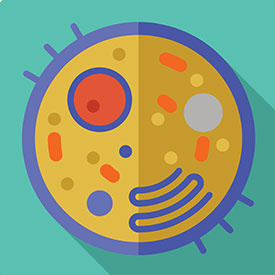 About 1.5 billion years ago, tiny visitors came to live inside the cells that later evolved into all plant and animal life, including humans. Those visitors were mitochondria, small organelles whose prominent role is producing 90 percent of the chemical energy that cells need to survive. Evolutionarily speaking, humans, animals, and plants are thus a combination of two organisms.
About 1.5 billion years ago, tiny visitors came to live inside the cells that later evolved into all plant and animal life, including humans. Those visitors were mitochondria, small organelles whose prominent role is producing 90 percent of the chemical energy that cells need to survive. Evolutionarily speaking, humans, animals, and plants are thus a combination of two organisms.
Leadership Material: Recent graduates embrace leadership roles in and outside of medical school
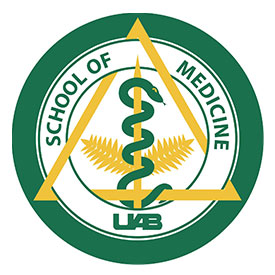 As medical training becomes more team-oriented, medical students are expected to learn to be not only skilled clinicians but also effective leaders. National medical and health care organizations gave several members of the 2019 graduating class unique opportunities to hone their leadership skills.
As medical training becomes more team-oriented, medical students are expected to learn to be not only skilled clinicians but also effective leaders. National medical and health care organizations gave several members of the 2019 graduating class unique opportunities to hone their leadership skills.
On the Front Lines of History: Pioneering surgeon and burn specialist Alan Dimick reflects on 50 years of service
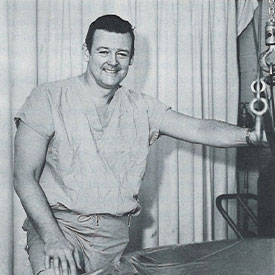 Few figures did more to improve Alabama’s emergency health care system during the 1960s than Alan Dimick, M.D. ’58. He was on the front lines, with achievements that include integrating the hospital’s emergency rooms, establishing the UAB Burn Unit, and pushing for the creation of a modern paramedics service.
Few figures did more to improve Alabama’s emergency health care system during the 1960s than Alan Dimick, M.D. ’58. He was on the front lines, with achievements that include integrating the hospital’s emergency rooms, establishing the UAB Burn Unit, and pushing for the creation of a modern paramedics service.
The Right Stuff: Alumnus shares his journey from medical school to a career in aerospace medicine
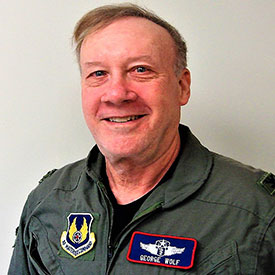 From flying with famed journalist Walter Cronkite through the aurora borealis in Canada to working with NASA scientists on space shuttle landings, E. George Wolf Jr., M.D. ’77, UHM, enjoyed an eventful 23-year career in the U.S. Air Force. As a flight surgeon and specialist in aerospace medicine (ASM) and undersea and hyperbaric medicine (UHM), he worked around aircraft and flight crews his entire career.
From flying with famed journalist Walter Cronkite through the aurora borealis in Canada to working with NASA scientists on space shuttle landings, E. George Wolf Jr., M.D. ’77, UHM, enjoyed an eventful 23-year career in the U.S. Air Force. As a flight surgeon and specialist in aerospace medicine (ASM) and undersea and hyperbaric medicine (UHM), he worked around aircraft and flight crews his entire career.
Windy City Wonder: Alumnus embraces role as medical school dean at Northwestern University
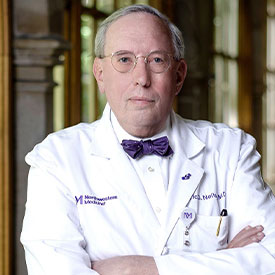 A lengthy journey from Long Island, New York, to Birmingham, Alabama, put Eric Neilson, M.D. ’75, on a path to be a medical student, physician-scientist, mentor, and ultimately a medical school dean.
A lengthy journey from Long Island, New York, to Birmingham, Alabama, put Eric Neilson, M.D. ’75, on a path to be a medical student, physician-scientist, mentor, and ultimately a medical school dean.
Transformational Giving: Recent gifts foster new era of cancer care and research
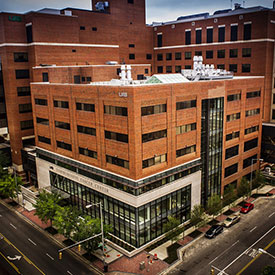 The O’Neal family knows the devastating effects cancer can have on patients battling the disease and their loved ones. “Our family, as well as the families of our friends, colleagues, and employees, have experienced the heartbreaking consequences that can accompany a cancer diagnosis,” says Craft O’Neal, chairman and CEO of O’Neal Industries Inc. That’s why O’Neal Industries Inc.—the family’s global business based in Birmingham—and its shareholders decided to give the largest single gift in UAB history: a $30 million donation to the Comprehensive Cancer Center. The gift will enable the now renamed O’Neal Comprehensive Cancer Center at UAB to change the lives of more patients and families through transformational cancer research, patient care, education, and prevention.
The O’Neal family knows the devastating effects cancer can have on patients battling the disease and their loved ones. “Our family, as well as the families of our friends, colleagues, and employees, have experienced the heartbreaking consequences that can accompany a cancer diagnosis,” says Craft O’Neal, chairman and CEO of O’Neal Industries Inc. That’s why O’Neal Industries Inc.—the family’s global business based in Birmingham—and its shareholders decided to give the largest single gift in UAB history: a $30 million donation to the Comprehensive Cancer Center. The gift will enable the now renamed O’Neal Comprehensive Cancer Center at UAB to change the lives of more patients and families through transformational cancer research, patient care, education, and prevention.
A Vision of Success: Philanthropic partnerships fuel remarkable progress in ophthalmology care and research
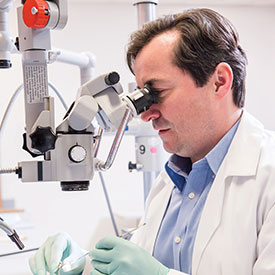 The UAB Department of Ophthalmology and Visual Sciences has made enormous strides in the past seven years, thanks in large part to generous gifts from philanthropic partners. Now, additional gifts from these supporters are helping further elevate the department’s top-ranked research program and world-class clinical care.
The UAB Department of Ophthalmology and Visual Sciences has made enormous strides in the past seven years, thanks in large part to generous gifts from philanthropic partners. Now, additional gifts from these supporters are helping further elevate the department’s top-ranked research program and world-class clinical care.
Remembering a Leader: Former pathology chair leaves legacy of excellence and generosity of spirit
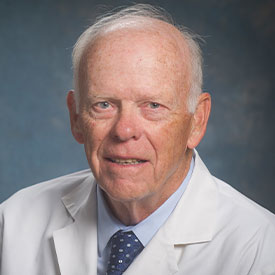 Jay McDonald, M.D., professor emeritus and former chair of the Department of Pathology, passed away June 5 after almost three decades of service to UAB. “Jay left a legacy of integrity and vision in the Department of Pathology and across the School of Medicine,” says Selwyn M. Vickers, M.D., FACS, senior vice president for medicine and dean of the School of Medicine. “He cultivated excellence in research and teaching, and his remarkable contributions continue to impact this institution. His passing is a true loss for the department, our school, the university, and the field of pathology.”
Jay McDonald, M.D., professor emeritus and former chair of the Department of Pathology, passed away June 5 after almost three decades of service to UAB. “Jay left a legacy of integrity and vision in the Department of Pathology and across the School of Medicine,” says Selwyn M. Vickers, M.D., FACS, senior vice president for medicine and dean of the School of Medicine. “He cultivated excellence in research and teaching, and his remarkable contributions continue to impact this institution. His passing is a true loss for the department, our school, the university, and the field of pathology.”
Linking Legacies: New endowed professorships honor distinguished cardiovascular disease faculty
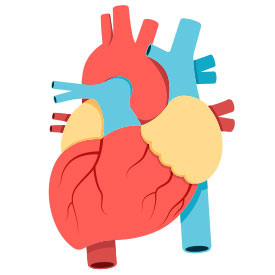 New endowed professorships recognize the impressive contributions of two longtime faculty members, John Holt Jr., M.D., and Albert Oberman, M.D., MPH. Holt’s career spanned five decades, during which he instilled a passion for the cardiovascular field in countless trainees. Oberman’s research helped lay the foundation for our current understanding of cardiovascular health.
New endowed professorships recognize the impressive contributions of two longtime faculty members, John Holt Jr., M.D., and Albert Oberman, M.D., MPH. Holt’s career spanned five decades, during which he instilled a passion for the cardiovascular field in countless trainees. Oberman’s research helped lay the foundation for our current understanding of cardiovascular health.
SK Bioscience Pledge Enhances Pneumonia Research
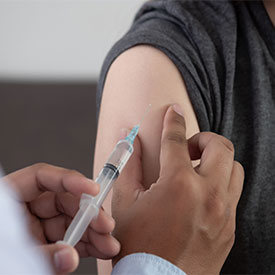 In 1918, the Spanish flu killed more than 50 million people worldwide, half of whom died from pneumococcal infections. If a similar outbreak occurred today, Moon Nahm, M.D., and his team in the World Health Organization (WHO) Pneumococcal Serology Reference Laboratory at UAB are making sure that more people are vaccinated and shielded from the deadly infections.
In 1918, the Spanish flu killed more than 50 million people worldwide, half of whom died from pneumococcal infections. If a similar outbreak occurred today, Moon Nahm, M.D., and his team in the World Health Organization (WHO) Pneumococcal Serology Reference Laboratory at UAB are making sure that more people are vaccinated and shielded from the deadly infections.
Board of Visitors Gifts Foster Promising Junior Faculty
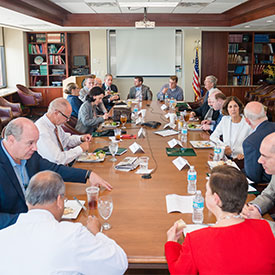 In addition to serving as advocates and advisers, the School of Medicine’s Board of Visitors (BOV) is helping ensure the future of a program that recognizes junior faculty and supports the recruitment and retention of highly competitive scientists and physician-scientists. Pittman Scholars, named for the late James Pittman, M.D., dean of the School of Medicine from 1973-1992, are assistant professors who have held that rank for fewer than five years. Their department chairs nominate them based on their research achievements and potential for continued discovery.
In addition to serving as advocates and advisers, the School of Medicine’s Board of Visitors (BOV) is helping ensure the future of a program that recognizes junior faculty and supports the recruitment and retention of highly competitive scientists and physician-scientists. Pittman Scholars, named for the late James Pittman, M.D., dean of the School of Medicine from 1973-1992, are assistant professors who have held that rank for fewer than five years. Their department chairs nominate them based on their research achievements and potential for continued discovery.
Legacy of Leadership: School of Medicine deans from the past 50 years
 The past 50 years have been marked by immense social and technological change. While the School of Medicine’s rich history dates back to 1859, we are pleased to join UAB in celebrating the university’s 50th anniversary in 2019. In that spirit, we present the deans who have led the School of Medicine through a remarkable half-century of progress.
The past 50 years have been marked by immense social and technological change. While the School of Medicine’s rich history dates back to 1859, we are pleased to join UAB in celebrating the university’s 50th anniversary in 2019. In that spirit, we present the deans who have led the School of Medicine through a remarkable half-century of progress.